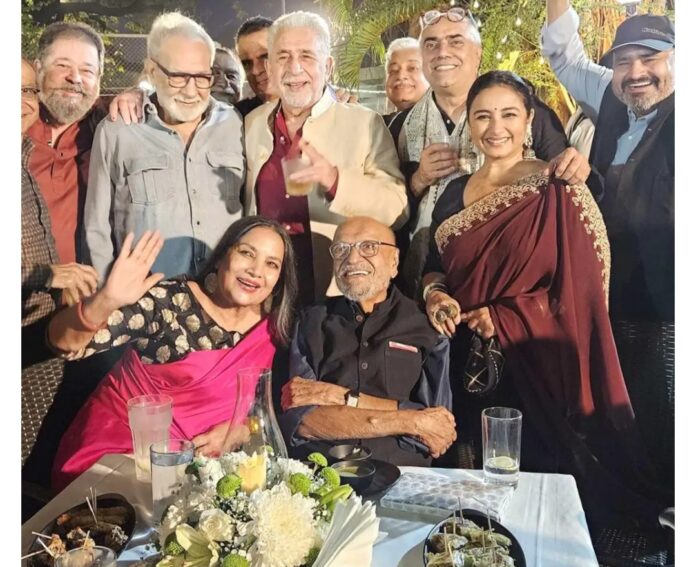Shyam Benegal is one of the most renowned filmmakers in Indian cinema, celebrated for his contribution to parallel cinema, a movement that sought to create more realistic, socially relevant films in contrast to the mainstream, commercial Bollywood style. With a career spanning over five decades, Benegal’s films have been a reflection of the changing societal landscapes of India, tackling complex issues with grace, authenticity, and a deep sense of humanism. From his early days in the world of theatre to becoming a trailblazer in Indian cinema, Shyam Benegal’s journey is one of constant innovation and commitment to meaningful storytelling.
### **Early Life and Background: The Foundation of a Filmmaker**
Shyam Benegal was born on December 14, 1939, in a middle-class family in Hyderabad, India. He initially pursued a career in science and joined Osmania University for a degree in economics, but his passion for the arts soon took precedence. Benegal’s interest in films began in his youth when he was exposed to both Indian and international cinema. His admiration for the works of filmmakers such as Jean-Luc Godard, Satyajit Ray, and Vittorio De Sica played a crucial role in shaping his cinematic vision.
After completing his education, Benegal moved to Mumbai (then Bombay) where he initially worked in the advertising industry and later found his calling in the world of cinema. His early involvement in the theater, both as an actor and director, honed his storytelling skills and gave him a strong understanding of narrative structure and character development. This experience would later influence his approach to filmmaking, especially his preference for naturalistic and character-driven stories.
### **Breakthrough in Cinema: The Rise of Parallel Cinema**
Shyam Benegal’s filmmaking career began in the 1970s, a time when Indian cinema was undergoing a transformative phase. Bollywood was dominated by larger-than-life musicals and masala films, but there was also a growing movement of filmmakers who were trying to break away from these conventions to create films that were more grounded in reality. This was the era of parallel cinema, which sought to address social, political, and cultural issues with a more nuanced approach. Shyam Benegal emerged as one of the key figures in this movement.
His directorial debut came in 1974 with the film *Ankur*, a stark and poignant portrayal of the feudal system in rural India. The film was a critical success and was lauded for its realistic depiction of societal oppression and class disparity. Benegal’s ability to delve into the complex emotions of his characters, combined with his eye for detail in depicting the socio-political landscape, made *Ankur* an instant classic. The film was also notable for introducing the talented actor Shabana Azmi, who would go on to become one of the leading figures in Indian cinema.
Following the success of *Ankur*, Shyam Benegal went on to direct several other notable films, including *Nishant* (1975), *Manthan* (1976), and *Bhumika* (1977). *Nishant* explored the brutal realities of feudal India, while *Manthan* focused on the social and political implications of the cooperative milk movement. *Bhumika*, based on the life of a female actor, was a daring exploration of the complexities of the human psyche, particularly a woman’s place in a patriarchal society.
### **Exploring New Themes and Styles**
Shyam Benegal’s films were never restricted to a particular genre or theme. He consistently explored different aspects of society, always emphasizing realism and social consciousness. His focus on storytelling with substance, rather than style or glamour, set him apart from mainstream Bollywood directors of the time.
In 1981, Benegal made *Kalyug*, a modern-day retelling of the Mahabharata, set against the backdrop of a corporate world. The film’s contemporary setting and the use of the epic to explore human greed, power struggles, and relationships marked a bold new direction in Benegal’s career. This was followed by *Satyajit Ray’s* biographical drama *The Making of the Mahatma* (1996), a film that chronicled the life of Mohandas Karamchand Gandhi during his early years in South Africa.
Benegal’s distinct style also found a new platform in television. In 1988, he directed the critically acclaimed TV series *Bharat Ek Khoj* (The Discovery of India), based on Jawaharlal Nehru’s book of the same name. The series was a remarkable effort to retell India’s history in an engaging and insightful manner, and it was praised for its educational value and historical accuracy.
### **Awards and Recognition: A Legacy Cemented**
Over the years, Shyam Benegal has been recognized with numerous awards for his outstanding contribution to Indian cinema. His films have not only been celebrated at national awards but have also found recognition in international film festivals, showcasing his universal appeal and the global relevance of his themes.
Benegal has won several National Film Awards, including Best Feature Film for *Manthan* (1977) and *Bhumika* (1977). He was honored with the prestigious Padma Shri in 1976 and the Padma Bhushan in 2005 for his contributions to Indian cinema. In 2007, he was also awarded the prestigious Dadasaheb Phalke Award, the highest honor in Indian cinema, which was a testament to his role in shaping the trajectory of Indian filmmaking.
### **Later Years and Current Endeavors**
In the latter part of his career, Shyam Benegal has continued to contribute to cinema and television, although his directorial output has slowed. He made his last film, *Welcome to Sajjanpur* (2008), which was another exploration of rural India and its complex social structures, further cementing his place as a filmmaker deeply connected to the heartbeat of India’s socio-political landscape.
In addition to filmmaking, Benegal has been involved in various initiatives aimed at promoting Indian cinema, including serving on several film advisory boards and juries at prestigious international film festivals.
### **Conclusion: A Visionary’s Legacy**
Shyam Benegal’s legacy in Indian cinema is defined by his commitment to realism, social change, and nuanced storytelling. He was a pioneer of parallel cinema and remains one of the most respected filmmakers in the country. His ability to handle complex subjects with sensitivity, his focus on character-driven narratives, and his unique style of filmmaking have left an indelible mark on Indian cinema.
As a filmmaker who shaped the cultural and political discourse of his time, Benegal continues to inspire new generations of filmmakers. His contributions to Indian cinema have not only entertained audiences but also sparked conversations about society, making his journey one of profound significance in the history of world cinema.



